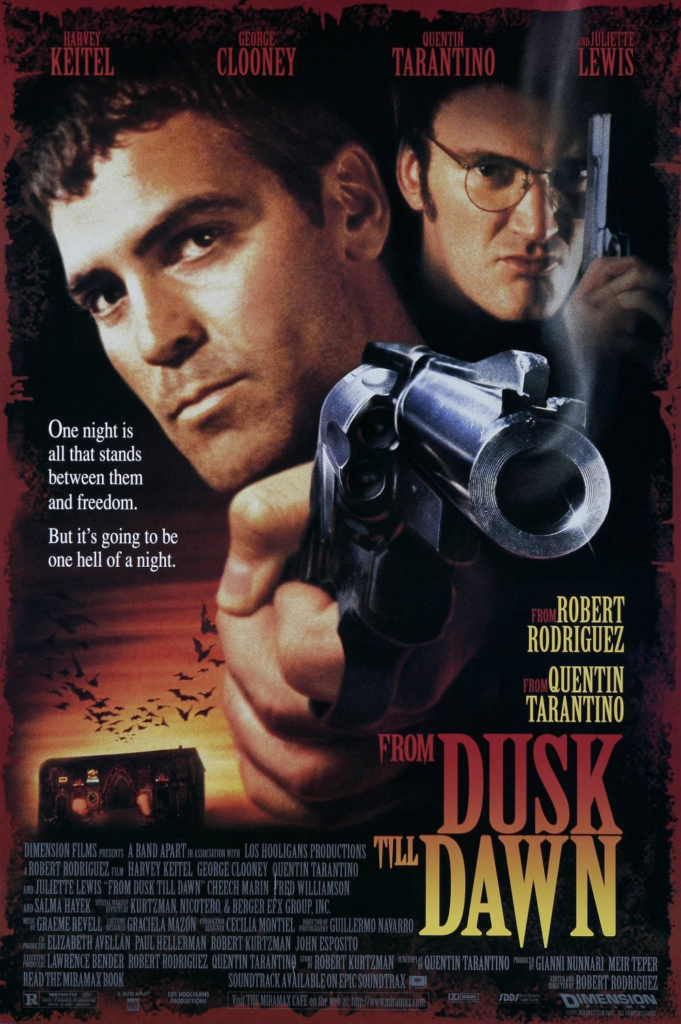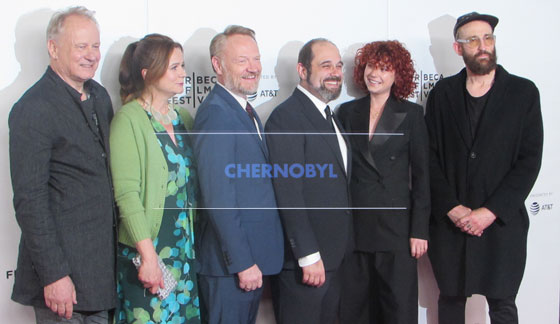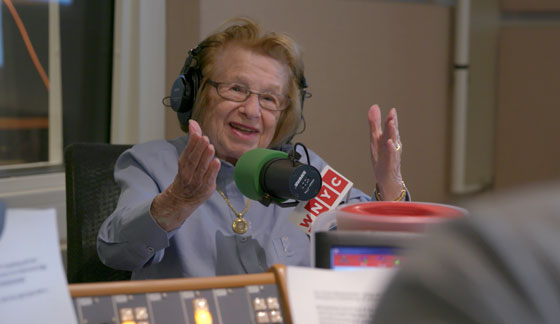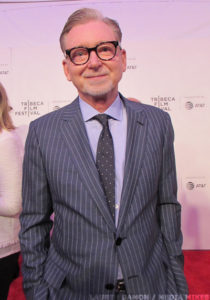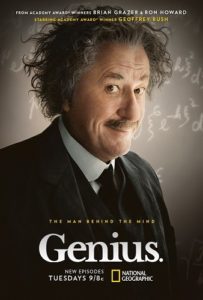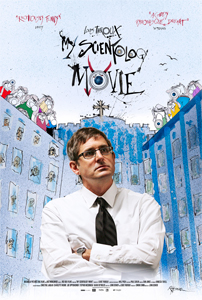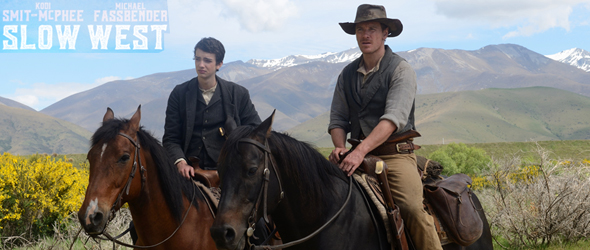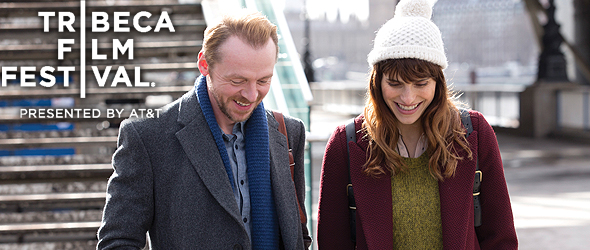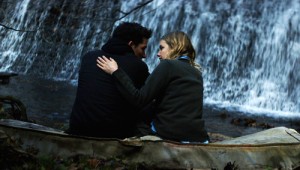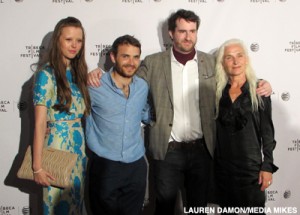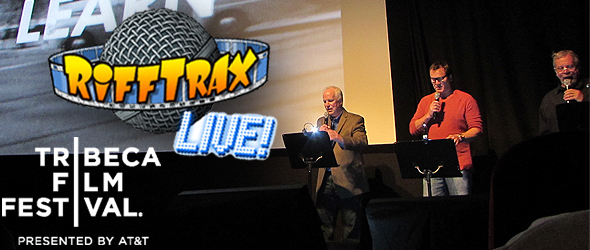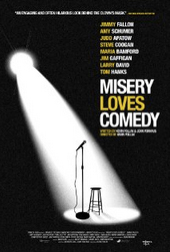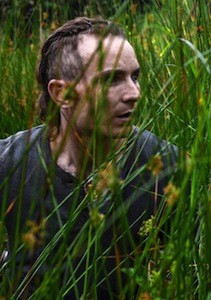Last month John Maclean’s Slow West had its New York debut at the Tribeca Film Festival. The film has since been available from DirecTV but the visually striking drama (read our 4-star review here) can be enjoyed on the big screen in its theatrical release as of May 15th. I sat down with director Maclean and star Kodi Smit-Mcphee (Dawn of the Planet of the Apes, next year’s X-Men Apocalypse) one rainy afternoon during the fest at New York’s Bowery Hotel to discuss more in depth the creation of the Michael Fassbender western.
Lauren Damon: John you actually got a degree in art and painting, did that inform your visual development of the film?
John Maclean: I think practically 100% of it in a way. Because it’s all connected and when I was making–when I was at art school I was doing a lot of collage which is pretty close to montage. And when you do look at really early early cinema, they’re so closed linked, you know. There’s cinema and films, paintings, then you have surrealists making films and Dali making films.
Kodi Smit McPhee: I love his films, so cool.
John: Yeah and Buñuel, do you know Buñuel’s stuff?
Kodi: No
John: Luis Buñuel
Kodi: No, I’ve been looking for more surrealism…
John: Oh he’s the ultimate. I’ll give you some names.
Kodi: Please. I didn’t even know you’re a painter. That’s amazing.
John: I studied six years at art school, painting.
Kodi: Really? I’m getting right back into it now. Oh my god, I love it. I’m thinking of maybe doing surrealism in graphic design, I like that.
John: Yeah, I mean especially surrealism.
Lauren: Yeah, that’s definitely evident in having, you have scenes horses attached by a clothes line to dry their clothes in the wind, or Kodi’s character alone in the desert landscape–did you sketch anything out?
John: Oh, I sketched every single shot, yeah. So it took me about four weeks to storyboard it but yeah, heavily storyboarded.
Lauren: Kodi, just prior to this you were in Jake Paltrow’s Young One’s where your character sketched a lot too…
Kodi: Actually ironically in a lot of movies, I just realized…
John: Weren’t you drawing in Planet of the Apes?
Kodi: Yeah. Planet of the Apes, [All the Wilderness], The Road…
Lauren: Is that something you do on your own anyway?
Kodi: I did when I was younger and I only realize now that like my ego–
John: Did you actually draw in Planet of the Apes or did some production designer give you half a drawing to fill in? [laughs]
Kodi: [laughs] No, they gave me half of like an amazing masterpiece to help, and I’m like ‘Alright, so I’m just going to do my seven-year old rest of it.’ But yeah, I loved drawing when I was little and painting but then I just stopped because I thought that I was just doing the same as other people but I’m not, at all, you know?
Lauren: No, it’s always going to be different.
Kodi: You end up owning it once you master the craft. And then once you master the craft, which only your passion can get you through, you can then talk however you want in the arts.
Lauren: Going back to that image of the horses, how was it working with all the livestock in the film?
John: [Laughs] That was actually–that was a scene where the people on the film, I can’t remember what they’re called, are they called bond people? …The people on the film that sort of question stuff that maybe can’t be done were very concerned about that scene [Laughs] But that was one of the easiest.
Kodi: The clothes line, yep.
John: That was actually pretty straight forward.
Kodi: Yeah
John: I think some of the harder scenes were just like eight horses in a row, standing still. So yeah, there was no problems with the horses but there was problems with some of the riders. [laughs]
Kodi: It’s pretty interesting and funny when you’re trying to do just like a dramatic, still moment and the horse is like just moving around–
John: Or a silent moment and just [horse noises]
Lauren: Did you have previous experience acting on horseback?
Kodi: Luckily, I did. I did Romeo and Juliet in Italy a little before this and I was trained by a jockey so I was pretty set for it–
Lauren: So you’re ready to go fast if you wanted?
Kodi: Yeah I love horses and you can actually build a really unique relationship with a horse if you’re not scared of it. So yeah…I think my horse’s name was Zeke, it was beautiful.
Lauren: I noticed when I interviewed Ben Mendelsohn regarding Silas leaving his gang that he seemed bit defensive of Payne, was this the remnants of anyone on set staying in character?
Kodi: We only had Ben for a tiny amount of time.
John: Yeah Ben was only around for three or four days of the whole shoot.
Kodi: If anything, he was just so cooperative just to try and get it done right.
John: I mean Ben had a really tough scene on the first day which was around the camp fire which, when I wrote the script I hadn’t realized that it was dialogue, silence, dialogue, silence, and there was nothing for him to be able to remember…Usually someone says something, you know someone else says something and it triggers you to remember your lines for the reaction. But there was no…Silas was just like [there].
Kodi: Yeah.
John: So it was basically like a massive monologue, so it was really really tough for him. And then after that was…all that in the field so that was much more fun.
Lauren: So he wasn’t ‘Payne’ on set?
John: No, because I never felt that it was that kind of film or it sort of merited that. Because it was, you know even between takes, it felt like the kind of film where the performances were supposed be kind of quite natural and very just action based so you know it very much just yeah…So it kind of felt like that wasn’t really needed. I think when you’re going into filming hand held digital for hours, someone being slowly destroyed in their mind and all that, you need to go in and out. I think the only time, I think Caren [Pistorious as Jay’s love interest, Rose], when she was at the ending–that I wouldn’t want to spoil–it was quite emotional for her, that scene.
Kodi: Yeah I was saying when it comes to the scenes within the story, you want to stay there. But when it’s obviously just like things like communication, I mean if anything it’s great to leap back into being cool with each other and communicating and kind of talking out the scene before you get back into it.
Lauren: When you read the script, did Jay’s love for Rose bring you back to any crush you’d had in your life?
Kodi: Actually I hadn’t had a lot…I mean now I have a beautiful girlfriend, but that’s only because I do relate to Jay in the way that I only want true love and I kind of see through the veil of all the bullshit in the world. And I was just kind of waiting for that, waiting for the right time and respected that. Yeah but nothing at the point of when I read the script, did it remind me of anything. But I love love. So yeah.
Lauren: Do you think growing up while making films kind of sheltered you from some of that sort of ‘bullshit’?
Kodi: Yes. Yes, absolutely. I mean it could have gone two ways and it could have actually thrown me into the bullshit if anything. It’s my journey, I believe, not just a coincidence that I was taken around the world and shown different cultures and yeah, just shown the state of the world. And it really planted a seed for an inquisitive mind.
Lauren: And you’re from Australia, but are you based in Hollywood now?
Kodi: I’m based in yeah, Studio City, kind still away from the bullshit [laughs]. It kind feels like a suburb type area so I feel pretty comfortable there. I’m there because of work, but I never work there. It doesn’t work out like that [laughs]. It’s cool.
Lauren: Was it nice for this film shooting in New Zealand, kind of closer to Australia?
Kodi: Yes, it was so beautiful and I was so stoked to be going back to New Zealand. I went there for two weeks when I was younger with my dad and I was, even really young, I knew I loved it so much. Everyone says that it’s one of the places in the world that mother nature’s still extremely present and that’s so true when you’re there. It’s just like another world, so beautiful.
Lauren: Were you familiar with Ben or his work as another Australian actor?
Kodi: Oh! Ironically, my father is an actor–he’s the one that got me into it when I was eight–and I lived in a place called Adelaide for, well before I was born, Ben Mendelsohn and my father actually did their first movie together.Well, my dad’s first movie. So it was just kind of weird to connect the dots like that. Makes a cycle.
Lauren: Did you dad visit this set?
Kodi: Yeah! He came to set and they saw each other and yeah, it was just cool to be in the middle of that, for sure. I felt a great connection and I told him, you know, I told him yesterday that even though we’re all the same sorts on the inside, he’s a huge inspiration to me, yeah, he’s a really cool person.
Lauren: Do you have any siblings?
Kodi: I have a sister who’s also an actress but configures more of her energy towards she wants to be a pop star…
John: How old is she?
Kodi: She’s twenty two and it’s been her dream since a child, so she’s really just embraced it. I completely respect her for that. And then I have a nine year old brother who is in Australia right now with my mum. And yeah, he’s a really cool kid [laughs].
Lauren: John, this being your first feature film, were there any assumptions you’d had that flew out the window as you moved from shorts to this?
John: I think just the mountain that I was about to climb. And I think if I’d almost known it, that I would have questioned doing it. You know, but you sort of break it down. So you don’t look too far ahead, you just look towards the week. So you’ve got the pre-production, and then you deal with that and then you’ve got the first day of shooting and you deal with that. Then you get into the rhythm of shooting and you deal with that. And then you finish and then you start editing, and then you do the music and the grading…So just the whole thing just is such–I’m kind of glad I did it when I’m a little bit older and a little bit more kind of…You know I speak to film students that want to make feature films and they’re like twenty and stuff…
Kodi: So eager.
John: Eager, yeah.
Kodi: I feel like I’m just waiting and there’s nothing I want to jump into yet.
John: Yeah, I think you need to…you need to just make short films, you need to read, you need to write, to learn and live. I mean some people–obviously you’ve got your Scorsese’s doing it when they’re six and stuff but I mean, for me it was just much more ‘Ok, this is the right time’ and it felt very comfortable and easy.
Lauren: Do you have a favorite part in all this process?
John: Shooting’s the best bit for me. Unfortunately shooting’s the shortest bit as well. You’re only really doing seven weeks of the shoot and the before bit is years and the after bit’s years. But really the buzz of being on set and the collaboration of being on set and the kind of routine of it, I just absolutely love.
Lauren: In an attempt to be a Michael Fassbender completionist, I couldn’t seem to find [their short film] Pitch Black Heist though.
John: No, I know. We’re going to try and get it out. It’s on the internet in Britain but it’s blocked in America, I know.
Kodi: Why’s that?
John: Because Film4 have got a licensing thing about it..It might come on DVD.
[writer’s note: Thank you, YouTube]
Lauren: Kodi, have you got ambitions to branch out in writing or directing?
Kodi: I definitely have ambitions but I think with wisdom comes the best recipe. So I’m literally just being the sponge that I already automatically am with this–not, immature mind–but this mind that’s still learning. And I just take advantage of it and yeah, taking it all as it comes. I know one day over there [pointing to John’s seat] I’ll have the great tools to express that.
Lauren: What do you think you picked up the most in working on Slow West?
Kodi: I–man, the most important thing for me in art is just like, I don’t know that new…like when someone does that thing that you love, that you want to do, it’s so inspiring. Because when it’s done right and it’s enjoyable and I don’t know. It really is what it is to anyone I guess. I can’t put words on it, I really can’t.
Lauren: Actually going back to John saying you had ‘The Mountain’ of your film earlier, I have to point out that you had The Hound from Game of Thrones in there, how long was Rory McCann shooting with you and how did he come to join your cast?
Kodi: He’s awesome.
John: He was absolutely amazing.
Kodi: He has the nicest heart in the biggest cage.
John: Yeah. And a great talent. He was in a bit of Scotland. We shot for a week in Scotland and he was there and then he came down to New Zealand and we had him for maybe one or two weeks in New Zealand, but it was great to have him around. He, I think Michael Fassbender suggested him because I was trying to figure out someone for the dad…
Kodi: Originally it was Rory for Jay.
John: [Laughs] Oh yeah Rory for Jay. Originally it was Michael for Jay [laughs]…Yeah, Michael suggested him and it was like [snaps fingers] wow.
Lauren: Had Michael worked with him before?
John: No, I think Michael had seen him in something that wasn’t Game of Thrones.
Lauren: Hot Fuzz? With his one line in that movie?
John: [Laughs] Yeah, again and again. But yeah, I loved working with him.
Lauren: And then how did you cast Caren?
John: Caren just it was tapes that were sent to me. She hadn’t done much, if any features. Her profile was pretty low and they were sending me a lot more experienced names and stuff and she was just–her tape was just better than anyone else’s.
Lauren: Kodi, did you speak much with her regarding your characters’ relationship in the movies?
Kodi: Beforehand? Yeah, I think it kind of stops at a point when you understand what’s happening. And that is just the whole heart in the wrong place idea. Which happens a lot in the world. But in this instance, it’s quite the colossal event. Because he has the ability to follow that vulnerable passion. So yeah, I think that kind of unfolds itself and then you get to put the ingredients in after you understand it.
Lauren: Without going to much into spoilers, but this is a western so it of course it has a shootout in there, how was it filming that? And had you experience with weapons?
John: That was the funnest bit of the whole shoot for me. Because you really–It was towards the end of the shoot and we’re kind of running out of time so we’re ramping up the shot lists and it was really quite exciting actually. We got the guy that was doing all the firearms stuff, he basically was Peter Jackson’s guy for, since the beginning. So he’d done all the Meet the Feebles and all that kind of stuff so he was really amazing. He was really amazing with shooting stuff and he turned up with this huge high-powered air thing for a lot of the exploding everything. So everything was just shot. So we just shot the hell out of the place.
Lauren: Did you get in much gunplay?
Kodi: There was a little bit and I obviously had to be like safely trained how to use it correctly and stuff like that. But I didn’t really use it much in the movie and we wanted it to–when I did use it–look like I had never used it. So I kind of used that! [laughs]
Lauren: Coming up you’ve got playing Nightcrawler in X-Men [Apocalypse], are you entering into any sort of stunts training for that?
Kodi: I think, I mean I’m probably not allowed to say this, but I read the script and I don’t think there’s much physicality for my character as of now. Probably due to his laziness in teleportation [laughs] Which I love! So I’m not going to complain about that.
John: You’re working on your tail though? [laughs]
Kodi: I’m working on my tail stunts, trying to flick it into people’s eyes.
John: Trying to grow it as well…
Kodi: [Laughs] Yeah trying to grow it out right now. It’s like [‘this big’ hand demo]
Lauren: There should be a protein shake for that.
Kodi: Tail Protein Shake! That’s great.
Lauren: Do you have a favorite super hero of your own?
Kodi: The coolest thing is that I really never was into superheroes or comics or anything and I didn’t think as an actor of my physicality would have a chance to play one. But then after I just kind of started researching life and stuff like that, you see weird coincidences in life that you soon realize aren’t coincidences and this character is—his real super power I believe is he’s a great person. Or whatever he is, mutant. And he’s in love with faith and god and he expresses love to his other superheroes who are going through hard times and essentially I think his—Fassbender says in interviews that that’s what’s so intriguing about X-men or even Star Wars. Its idea, it’s got this mask on it but what’s under it is relative emotions so yeah I really can’t wait to get into that. It’s so , again.
Lauren: Yeah, like Kurt, Jay in Slow West does have that spiritual angle to him
Kodi: Yep and intellectual and has the seed to want to know about the universe and that is also a seed in and of itself that ends up just making you go back to yourself.
Lauren: Talking of the ideas in larger films, Slow West has a lot of small, very intense intimate scenes, for instance Silas just trying to calm down a woman holding a gun, what’s the inspiration for these?
John: I think it’s just there’s things like that and the washing line scene, when you’re thinking up what’s happening next, it kind of one thing leads to another and it seems like the only practical solution. So the only practical solution for Silas in that situation is to try and get Jay to calm down by saying breathe. And the only way for him to say that to Jay and bring him out is to pretend he’s saying it to the girl…
Kodi: I don’t mean to go so deep but when you have a mind like mine, and you’re reading a script and you see how cause and effect and laws literally work—Like, if you’re at one with truth, then everything just falls into natural light. You don’t have to pull anything from anywhere, it just naturally happens.
John: It’s a lot of practicality, like if you’re clothes are wet and you have to ride somewhere, then you make a washing line, you know? So you kind of—hopefully it was just all coming out of…pI think that’s how, it’s like not having to think of anything too surreal or witty, but just think more practical things and then you will happen to be, by nature, witty or surreal.
Lauren: I can’t help but notice that when it comes to Jay, he seems like an intelligent character and for him to trust Silas’s intentions when he offers help seems just sort of willfully naive.
Kodi: Yeah, I mean I think maybe not even because…it’s like a theory I have that you can rev your engine so much in first gear, but it’s not going to get to the second gear until it’s the right time…So I think that’s where he’s at. And that’s where nature works. It’s like no matter what, you can know as much as you want but if you’re acting from where you are, it’s only going to have equal effect. So yeah, I think it doesn’t matter how really smart he was, he’s always going to be immature in some way.
John: Yeah I mean I just thought that Jay was the kind of person that sussed Silas out from the first moment he saw someone that was lost and lonely. And he had such a perceptive view on when certain characteristics of people, or certain—but because of that detail, and because of that perception missed the huge big picture that [Silas is] a bounty hunter [laughs]. So you know, it’s like…he nailed Silas immediately with the lonely thing but missed out on the whole ‘I’m leading him to the bounty’.
Lauren: And finally, what’re you working on next?
John: Seeds of ideas that will start developing in the next few months into something. So yeah, I’ve a bit sort of enjoying the traveling and space before starting to write again.
